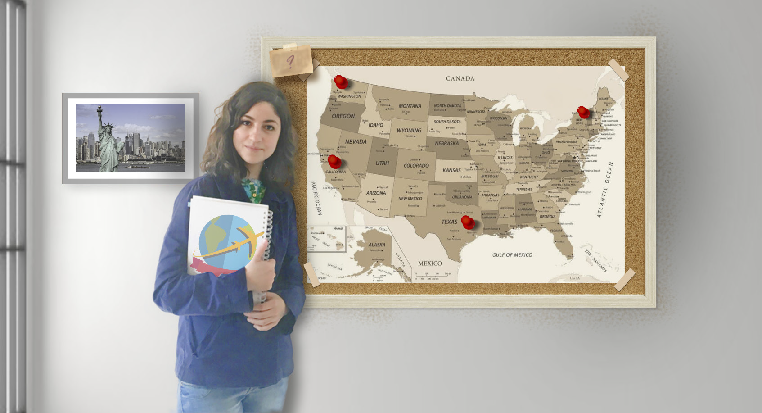Lengua extranjera II [2024E]
Descripción de la sección
-

Introduction
You have successfully completed the UAI Lengua Extranjera 1, congratulations!
Now you can use what you have learned in your second UAI Lengua Extranjera 2. To increase your knowledge of the English language you will have to use what you learned in addition to new information. Using verbs in present and past will help you learn how to use of “going to” and “will” to express the future time tense.
You will continue to use and develop your four basic linguistic abilities: reading, writing, listening and speaking.
The UAI Lengua Extrajera 2 is made up of 5 modules, each containing topics that will help you create your final project. This final project consists in a simulation of a student exchange program; can you imagine studying your Trayectoria de Aprendizaje Especializada (TAE) abroad?
Your final project has three parts. The first part needs you to complete the activities from modules 1 and 2 and then you need to create a student work plan. In the second part needs to be completed using modules 3 and 4, here you will write your personal resume. For the third part you will evaluate your spare time on a graph.
After you complete those three parts, you can begin working on the final project, the student’s exchange program. This will lead you to use a second language more and more.
Nice working with you!
-
Objective:
Discuss “intentions and personal opinions” in English using the four linguistic abilities (writing, reading, listening and speaking) focusing on everyday situations. -
Comparative and superlative adjectives
 IntroductionHave you ever been to the Zoo? There are so many animals to describe! We use adjectives to describe people, places, animals and things. Another possibility is to use comparatives and superlatives. We can say the giraffe is taller than the lion or that the elephant has the largest ears. Do you know how to make descriptions or how to use the comparative or superlative adjectives? This module will show you how to do these things.
IntroductionHave you ever been to the Zoo? There are so many animals to describe! We use adjectives to describe people, places, animals and things. Another possibility is to use comparatives and superlatives. We can say the giraffe is taller than the lion or that the elephant has the largest ears. Do you know how to make descriptions or how to use the comparative or superlative adjectives? This module will show you how to do these things. Topics
Topics- Comparative adjectives: Forms and spelling rules
- Vocabulary: Clothes, describing people or others
- Superlative adjectives: Forms and spelling rules
- Vocabulary: Clothes, describing people, describing places or others.
- Comparative adjectives: Forms and spelling rules
-
Future

Introduction
Do you think about your life in the future, in 1 year, 10, 15, 20 years?When we think/talk about events that have not occurred yet, we relate to the future. The future can be described two ways:
With will or going to + verb.One example could be:
Mary is going to graduate in June.
Tony will drive his mom to work tomorrow.
What will you do next weekend?
Do you have plans?Think about these structures and you are on your way to your future.Have fun while getting from now to then!!Topics- Future: Will
- Vocabulary: Future plans, travel plans or others.
- Going to
- Forms and spelling rules
- Vocabulary: Transportation, schedules or others.
-
Can/can’t

Introduction
The verb can is used to talk about possibilities and abilities; also we can use it to ask for and give permissions, to make requests and offers. As you can see it is a very flexible word that can be used in a huge number of situations and we are going to practice them in the following activities.

Topics
- The verb can/ can’t.
- Vocabulary: Talents and abilities, tourist sites or others.
-
Should / have to.
 Introduction
Introduction
Do your parents and friends eat fast food? Do they practice sports or exercise?If the answer is yes, did you know that there are many diseases caused by poor eating habits and lack of physical activity?In this module we will see how to give suggestions and warnings about what people should do and what they have to do to enjoy a healthy life style using new vocabulary and grammar.We use should:
• To ask for and give advice.
• To express an opinion.
• To make a suggestion to do something.Topics- Should / have to
- Vocabulary: Fast food, exercise, habits and routines, lifestyles or others.
-
Must be / may be / might be /
could be / can’t be. IntroductionThe world we live in is full of possibilities. We have choices for everything we do. When we talk about possibilities this means there is a 50 / 50 chance between yes or no.To use possibilities we normally use: must be / may be/ might be / could be / can’t be.If you travel you have a lot of options, many things to do, to eat or places to go. You must be ready for anything; you might be surprised with what you find, so enjoy the adventures and explore all possibilities!As mentioned in the introduction, to choose a possibility we normally use: (must be / may be/ might be / could be / can’t be) when we have only two choices.Topics
IntroductionThe world we live in is full of possibilities. We have choices for everything we do. When we talk about possibilities this means there is a 50 / 50 chance between yes or no.To use possibilities we normally use: must be / may be/ might be / could be / can’t be.If you travel you have a lot of options, many things to do, to eat or places to go. You must be ready for anything; you might be surprised with what you find, so enjoy the adventures and explore all possibilities!As mentioned in the introduction, to choose a possibility we normally use: (must be / may be/ might be / could be / can’t be) when we have only two choices.Topics- Must be / may be / might be / could be / can’t be
- Vocabulary: Extreme natural events or others.
-
Final project
 For the Final Project it is necessary to gather all the activities and Project advances that you have so far.Using the vocabulary and the grammar you learned in previous modules and write about your experiences learning how to participate in a student exchange program.
For the Final Project it is necessary to gather all the activities and Project advances that you have so far.Using the vocabulary and the grammar you learned in previous modules and write about your experiences learning how to participate in a student exchange program.


